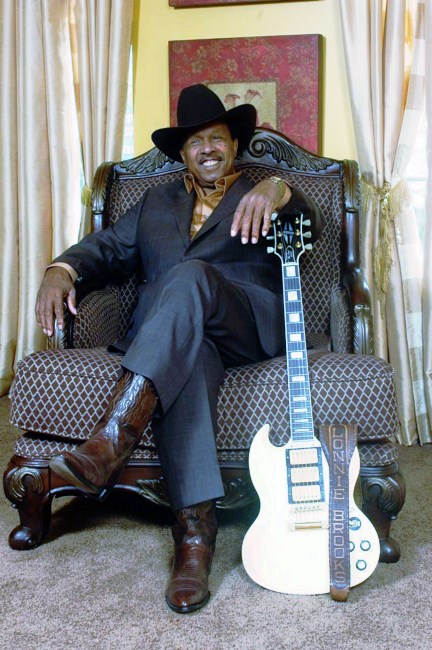
AVIS DE DÉCÈS
Lee Baker, Jr.
18 décembre 1933 – 1 avril 2017

In a news statement Sunday, Chicago Mayor Rahm Emanuel praised Brooks as a Chicago blues legend with a towering talent and soulful style that won him legions of fans across the country and around the world.
His celebrated career inspired generations of music lovers, garnered numerous awards, and brought him from the clubs of Chicago’s West Side to the concert halls of Europe and beyond.
Brooks was born Lee Baker Jr. Dec. 18, 1933, in Dubuisson, Louisiana. He was introduced to the blues by his banjo-plucking grandfather. Later, in the early 1950s, he decided to pursue a musical career after moving to Port Arthur, Texas, where he heard live sets by blues legends including T-Bone Walker, B.B. King, and others. During his solo career, Brooks called himself Guitar Jr., but he dropped the moniker after moving to Chicago in 1960 because Luther Johnson had called himself Guitar Jr. long before Brooks. It was in Chicago that Lee Baker became Lonnie Brooks. Brooks played clubs on Chicago's South Side and West Side, as well as in joints in neighboring Gary and East Chicago, Indiana.
His debut album, "Broke an' Hungry," was recorded in 1969. Six years later, his album "Sweet Home Chicago" featured the title track that made him famous. Successive albums included "Bayou Lightning" (1979), "Turn on the Night" (1981), "Live at Pepper's" (1985), and "Satisfaction Guaranteed" (1991)." Brooks made appearances in two films, "Blues Brothers 2000" and "The Express." He also made a cameo appearance on an episode of TV's "Hee Haw." Brooks also co-authored the book "Blues for Dummies" along with son Wayne Baker Brooks and Michael "Cub" Coda, who wrote the Brownsville Station hit "Smokin' in the Boys Room."
Brooks is survived by two sons, the blues artists Ronnie Baker Brooks and Wayne Baker Brooks.
Montrez votre soutien
Envoyez Vos
Condoléances
Partager
L'avis De Décès
Obtenir les mises à jour
Prestations de Service
Partager l'avis de décès
- RECEVOIR DES RAPPELS
v.1.9.5